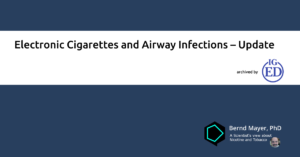Archived version of Prof. Dr. Bernhard-Michael Mayer’s blog post.
Originally published on 08.02.2015
Recently it has been reported that mice exposed to nicotine containing vapor of electronic cigarettes exhibited reduced immune defense to bacterial infection 1. From the mouse data, the authors infer that consumption of electronic cigarettes may compromise the immune response of humans. This result attained considerable media coverage and is expected to be embraced by health authorities eagerly searching for detrimental effects of e-cigs to justify strict regulations and bans.
However, nobody would have cared about this result, and no journal would have accepted the paper if the authors had replaced “electronic cigarettes” in the title by “nicotine”. It has been known for decades that nicotine has anti-inflammatory effects associated with mild immune suppression in mice and rats e.g. 2 3 4 5 6 7
According to these and many more published papers, the anti-inflammatory effects of nicotine are mainly mediated by inhibition of release of pro-inflammatory cytokines, an effect typically associated with suppression of immune function. Based on these observations, drugs stimulating nicotinic receptors on non-neuronal, in particular immune cells were considered as being useful for the therapy of inflammatory and infectious diseases, such as rheumatoid arthritis, inflammatory bowel disease, inflammatory disorders of the brain, and sepsis as well as metabolic diseases and cancer immunotherapy e.g. 8 9 10 11 12 13 14
These reports may look promising, but immune function of mice and rats translates poorly to the human condition, a well-known nuisance for experimental immunologists involved in drug development (see e.g 15). So far, no nicotinic receptor agonist has made it to market, and there is not a trace of evidence that nicotine replacement therapy is associated with impaired immune function. Thus, there is no reason to worry that nicotine consumption, either by consumption of FDA-approved medicines or inhalation of nicotine containing vapor, might cause significant immune suppression.
In a previous blog article, I presented the results of a survey on the frequency of airway infections (common cold) among e-cig users who had not been smoking for at least two months. Meanwhile, the number of votes has more than doubled (from 307 to 657) – with no significant change in outcome: total: n=657 (100 %), infections decreased: 441 (67.1 %), no change: 193 (29.4 %), infections increased: 23 (3.5 %)
These results may still be judged as anecdotes without scientific value. However, the data are surprisingly robust and unequivocally demonstrate the experienced benefit of switching from tobacco smoking to vaping, with almost 70 % of users reporting decreased incidence of airway infections and hardly any reports of worsening. The improvement could be simply due to discontinuation of smoking but additional beneficial effects of inhaled propylene glycol are also conceivable. Regardless the underlying cause, the results obtained by Sussan et al. with nicotine-exposed mice are in sharp contrast to the highly positive experience of humans switching from smoking to vaping.
Quellen
- Sussan et al., 2015 http://journals.plos.org/plosone/article?id=10.1371/journal.pone.0116861
- https://www.ncbi.nlm.nih.gov/pubmed/1124887
- https://www.ncbi.nlm.nih.gov/pubmed/1517531
- https://www.ncbi.nlm.nih.gov/pubmed/8786295
- https://www.ncbi.nlm.nih.gov/pubmed/10734166
- https://www.ncbi.nlm.nih.gov/pubmed/11675127
- https://www.ncbi.nlm.nih.gov/pubmed/20843956
- https://www.ncbi.nlm.nih.gov/pubmed/12033743
- https://www.ncbi.nlm.nih.gov/pubmed/17206646
- https://www.ncbi.nlm.nih.gov/pubmed/19155522
- https://www.ncbi.nlm.nih.gov/pubmed/20379354
- https://www.ncbi.nlm.nih.gov/pubmed/20387124
- https://www.ncbi.nlm.nih.gov/pubmed/20957418
- https://www.ncbi.nlm.nih.gov/pubmed/24276790
- https://www.ncbi.nlm.nih.gov/pubmed/23382184

